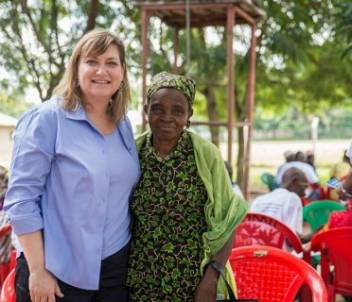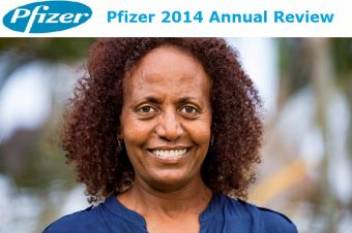 Eat right, exercise and keep active. I’m bombarded with these messages everywhere I go – the grocery store, the doctor, the gym.
Eat right, exercise and keep active. I’m bombarded with these messages everywhere I go – the grocery store, the doctor, the gym.
The message is clear – healthier lifestyles can have a major impact on your chances of dying from a non-communicable disease, such as heart disease or diabetes.
The last place I expected to have this message reinforced was on my recent visit to Kibaha, Tanzania, a rural district outside of Dar es Salaam. Thanks to Pfizer’s support of HelpAge’s programmes, I spent the day learning about how people in Tanzania are promoting healthier lifestyles and the impact it is having on their health.
Older volunteers care for the housebound
When I arrived in Kibaha, I spoke with Elizabeth Nkwera outside the local clinic. Elizabeth is retired but volunteers and visits about half a dozen housebound older people every week in the village.
I smile when she tells me she is visiting “older people” and ask how old she is. She proudly responds that she is 78 and can still walk around the village visiting people in their homes, helping them with basic tasks and caring for them.
She talks to them about eating healthily and not smoking and urges them to visit the clinic to get their blood pressure tested.
Elizabeth and other home-based caregivers received training to learn about the causes, symptoms, prevention and management of non-communicable diseases, such as hypertension and diabetes.
A visit to Hadija
I was curious how they used their training in practice and was able to accompany Batret on a home visit to check on Hadija, an older woman who has been suffering from high blood pressure.
Batret told me that when she first started visiting Hadija, her legs were swollen and she couldn’t move around a lot.
After several visits, she was able to persuade Hadija to visit the clinic where she was diagnosed with hypertension and given some medicine to help get it under control.
Hadija has now stopped smoking and attends an “Active Ageing Group”. Batret is happy to see that Hadija’s health has improved and says that is why she does this work.
Young and old share information
We end the visit by going to an Active Ageing Group in the village. The group meets weekly and gathers people  young and old from the village to learn about healthy behaviours, such as regular exercise and healthy cooking methods.
young and old from the village to learn about healthy behaviours, such as regular exercise and healthy cooking methods.
On the day I was there, Ellen Majiba was supervising the group as they cooked a healthy meal of boiled beans, fruit, some cooked greens and bread.
While the cooking was taking place, Ellen had several groups gathered around learning some stretching exercises as well as how to do basic massages to help the blood flow and comfort aches and pains.
One of the innovative aspects of the project is its intergenerational approach. It encourages older and younger people to interact and urge each other to live a healthy lifestyle.
Long term prevention of non-communicable diseases
We are learning that information flows in both directions – kids can be influenced by their older family members and in turn, kids who learn about health and nutrition bring those messages home.
Kibaha is just one of the communities where Pfizer is sponsoring this work. Through their support, HelpAge is working with the Ministry of Health, healthcare workers, caregivers and others to improve the prevention and control of non-communicable diseases.
Through this innovative approach, HelpAge is seeing results and will be tracking them over the long term and contributing to national efforts focused on preventing the growing threat of non-communicable diseases.
Find out more about our work in Tanzania.
Read more about our Affiliate HelpAge USA.
Down our booklet which provides basic knowledge and skills to older people carers on how to address non-communicable diseases (in Swahili).
